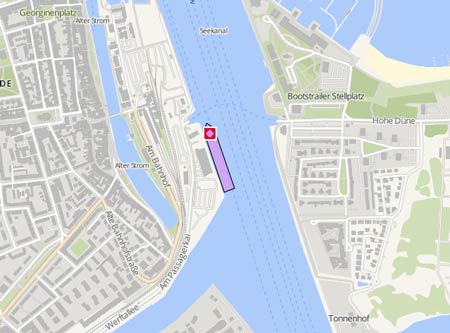STEN ARNOLD
Kurs/Position
vor 2 Min
Die letzten Häfen
Die letzten Wegpunkte
Die neuesten Nachrichten
NTSB report into grounding incident published
The German Federal Bureau of Maritime Casualty Investigation (BSU) published an incident report in which the 'Sten Arnold', en route from Amsterdam to Hamburg with a cargo of 13,925 tons of petrol, encountered a critical navigational incident in the River Elbe, on Aug 21, 2022. The ship was loaded with 13,925 t of petrol. The first River Elbe pilot boarded the ship at 1050. From this point on, the bridge was manned by the master, an deck officer, and a helmsman. Due to her shallow draught, the ship was not dependent on the River Elbe navigation channel. The pilot transfer took place level with Brunsbüttel at 1440. In addition to the pilot, the bridge was now manned by the Lithuanian master, the Filipino chief mate, and a Filipino rating with watchkeeping proficiency who was at the helm. The pilot transfer took place level with Brunsbüttel at 1440. In addition to the pilot, the bridge was now manned by the Lithuanian master, the Filipino chief mate, and a Filipino rating with watchkeeping proficiency who was at the helm. After the pilot transfer, the voyage continued at a speed over ground of about 9.4 kts. A ebb current of about 2 kts and 4 Bft west-south-west wind prevailed. Visibility was good. At 3.04 p.m., the ship suddenly lost speed and came to a standstill. Shortly afterwards, the ship’s command and the pilot realised that the ship had grounded on an unknown shoal in the fairway. The ship was listing 2-3° to port. The lateral distance to the virtual connecting line between the fairway buoys (green buoy line) was about 120 meters. The 'Judith' was sailing slightly astern in the navigation channel and passed the 'Sten Arnold' at a safe distance about one minute later. An ebb current still prevailed when the vessel grounded. The water-level gauge in Brunsbüttel indicated +1.08 m based on Chart Datum. Low tide was at 1616. The pilot informed VTS Brunsbüttel at 3.12 p.m. and the latter notified other traffic about the incident and requested due care. At 1528, the Ship Safety Division (BG Verkehr) authorised the vessel to continue her voyage after she refloated on condition that the hull was not damaged and the machinery fully operational. An order concerning an escort tug was also issued. The WSA Elbe-Nordsee moved buoy 63 back to its intended position on Sep 2, after the shoal was cleared and completion of a control sounding on Aig 31. The GDWS notified in its statement that WSA Elbe-Nordsee had increased dredging capacity through additional calls for tender. In addition, the HPA agreed to temporarily take charge of sounding and dredging works for the first 15 km downstream of the Hamburg port boundary in 2023 and 2024. This section accounts for 20-25% of WSA Elbe-Nordsee’s maintenance dredging. One immediate measure was that the sounding frequency was increased to up to 14- day intervals in the area between Elbe-km 686 and 690, especially at active transfer sites. This has simplified resource management within the existing dredger fleet. As a result, the GDWS expects greater reliability with regard to maintaining the planned depths in the navigation channel and thus also a reduction in the number of shipping police measures. The GDWS introduced the reduction in permissible draughts with a lead time of four to six weeks. This was to give ship operators the opportunity to prepare for this when planning routes and loading ships. Running aground in the fairway near buoy 63 on the River Elbe came as a complete surprise to the crew of the vessel. Moreover, the pilot had no way of averting the incident, as the more detailed navigational chart in his PPU did not contain any information about it, either. Responsible for maintaining the fairway with its organisational unit WSA Elbe-Nordsee, which is in charge of the River Elbe up to the North Sea, the GDWS was also surprised by the development of the shoal. Despite many years of experience with sediment transport in the River Elbe, this rapid development was unexpected. Since the dredgers did not operate at transfer sites 689_4 and 689_5 HPA due to the restriction from 15 April to 30 June 2022 to protect red herring, the WSA Elbe-Nordsee assumed that only minor changes would take place there. The GDWS now assumed that the low inflow of headwater, which continued in 2022, facilitated the changes seen. However, the increased number of storm surges in that year are considered to be the main cause. Although the information available to the BSU indicates that no storm surges occurred in the period from April to August 2022, it is assumed that sand set in motion during the previous storm surges was still ‘in circulation’ and that tidal pumping had transported it further upstream. The failure to discover the shoal was facilitated by the cancellation of the sounding operation at the area in question scheduled for 7 July 2022. The cancellation was due to technical and personnel-related losses of sounding vessels belonging to the authorities. Overall, this led to a reduction in ship operating time of more than 50% in the period under review. Most of these days lost were due to technical reasons. To compensate for the resulting lack of sounding capacity, the WSA acted in accordance with the specifications of the technical concept and traffic safety was prioritised to the benefit of the navigation channel. After analysing the accident, the GDWS implemented the measures described in subsection 2.2.11. The BSU assumes that these adjustments will be sufficient to guarantee the safety of shipping in the fairway going forward. Accordingly, safety recommendations will not be issued.
News schreiben

